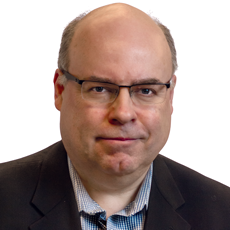
I fancy myself a brave and intrepid hiker, and a couple weeks ago chose a particularly daunting trail that was rumored to lead to some of the best possible views of Mount Hood, the 11,249-foot peak that towers over Portland, OR.
The trailhead was enveloped in fog when I arrived, but with a 3,000-foot elevation gain in my future, I believed I’d break through it. Instead, the mist got thicker, wetter and colder as I plodded my way upward. It was rather unnerving to be stumbling along when I couldn’t see the road ahead, when I had to simply trust the red navigation line on my phone’s trail app and take it one step at a time.
Long hiking story short, this adventure ended with little of the promised pay-off. I was seeking spectacular scenery, but got nothing but low-grade hypothermia and vague shapes in the fog. I arrived back home safe but mercilessly grumpy and sore, and wondering why I had even gone there in the first place.

Plodding blindly through the fog. Feeling like there’s no end in sight. Searching vainly for stable footing. Stumbling through challenges with no idea what the final destination is, or what the big picture looks like. To long-term care staff, I imagine that sounds all too familiar.
So let me tell you what happened the next weekend. I went back, and did the same trail again. And this time, under sunny skies, the blind steps I’d taken tentatively before made perfect sense. My confidence grew, and my footing seemed more solid when I could see where I was going. In the clear context of a sunny day, beauty replaced where fear had dominated, and my effort appeared worthwhile and generously rewarded. Even my ill-fated previous attempt seemed like an important and inevitable part of the journey.
With long-term care and the rest of the planet still mired in the Delta darkness, many facility staff feel like they’re stumbling in the fog. Along with dire staffing challenges have come overwhelming expectations on those who remain, and your resilience is being tested like never before. Somehow, you’re still keeping your feet moving, plodding ahead, giving the best of yourselves and your skills to your residents. But it’s exhausting, unstable and disorienting when you can’t see clearly where you’ve been or what lies ahead.

I’m reminded of a story I heard Olympic Gold Medalist and cancer survivor Scott Hamilton tell at a conference a few years back. He talked about how, in the early days of his diagnosis and treatment, he felt like he was trapped in a storm on a lake, randomly leaping in all directions from rock to rock just to survive. But with the passage of time, when the wind calmed and the sun broke through, he was able to look back and see how what seemed like random rocks strewn in all directions had actually been in a perfect line, guiding him to peace and healing.
That’s my hope for all of us, and especially for those of you on the front lines caring for seniors. That when we finally get to the other side of this pandemic, we’ll be able to more clearly see past the horror of what we’ve endured to the beauty of what we’ve accomplished. We’ll appreciate the strength and resilience we gained and the lives we touched — and even saved. Lifting our eyes from the daily stresses to the path that’s led us here, we’ll see how every rock lined up perfectly.
Someday, hopefully soon, the chaos and fog will lift, and when it does, the view will be spectacular.
Things I Think is written by Gary Tetz, a two-time national Silver Medalist and three-time regional Gold and Silver Medal winner in the Association of Business Press Editors (ASBPE) awards program, as well as an Award of Excellence honoree in the recent APEX 2020 Awards. He’s been amusing, inspiring, informing and sometimes befuddling long-term care readers worldwide since the end of a previous century. He is a writer and video producer for Consonus Healthcare Services in Portland, OR.
The opinions expressed in McKnight’s Long-Term Care News guest submissions are the author’s and are not necessarily those of McKnight’s Long-Term Care News or its editors.





